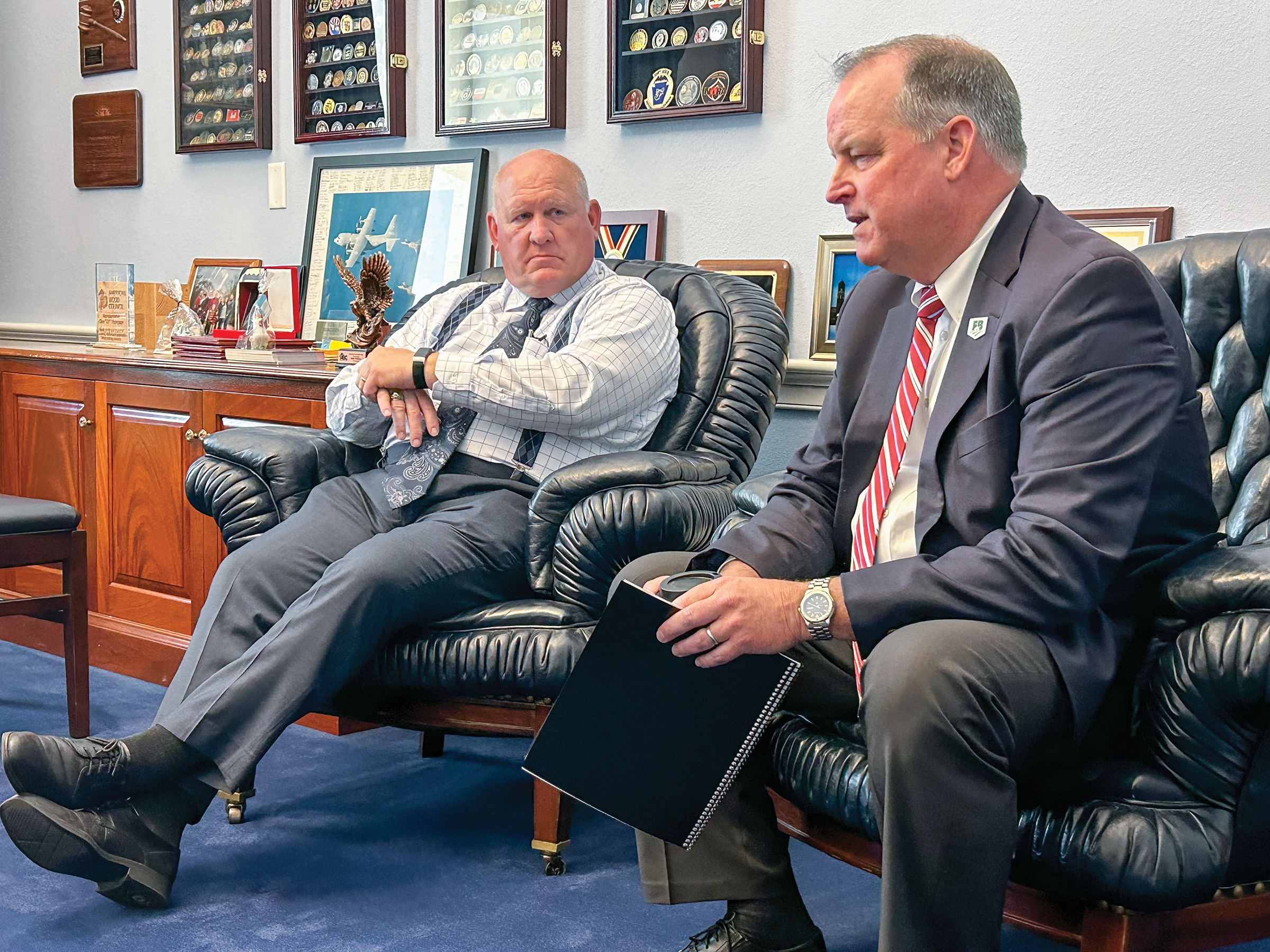Farmers make voice heard in Washington

California Farm Bureau President Jamie Johansson, right, meets with Rep. Glenn “GT” Thompson, R-Pa., chairman of the House Committee on Agriculture. A delegation of Farm Bureau leadership and policy staff advocated in Washington, D.C., on issues such as the 2023 Farm Bill, labor and forestry.
Photo/Christine Souza

By Christine Souza
During time spent in Washington, D.C., as Congress debated the deal to extend the debt ceiling to avoid default, a delegation of California Farm Bureau leaders met with lawmakers to advocate on important issues facing farmers and ranchers.
“It is an extremely important time to be in Washington, D.C., especially during the debate about the debt ceiling and what solving that means for future legislation that we in agriculture need, whether that is disaster relief or developing the 2023 Farm Bill,” said California Farm Bureau President Jamie Johansson.
Farm Bureau leaders and the organization’s federal policy team met with lawmakers in the nation’s capital May 23-25. Discussions focused on important agricultural issues, such as the next federal farm bill, labor, water, forestry and addressing disasters, such as flooding and wildfires.
In meetings with Rep. Glenn “GT” Thompson, R-Pa., chairman of the House Committee on Agriculture, which has oversight to craft a five-year farm bill, the delegation received positive feedback while advocating for programs that California farmers, ranchers and foresters would like to see in the farm bill. The omnibus legislation contains 12 titles of programs, including for nutrition, crop assistance and conservation. The 2018 Farm Bill is set to expire in September.
Matthew Viohl, California Farm Bureau associate director of federal policy, said the Farm Bureau delegation advocated for “things we’ve been talking about for almost a year now, such as a very high-level crop insurance and risk-management programs. This is what we are looking to see really grow in the farm bill.”
Farm Bureau leaders, in meetings with representatives and legislative staff, urged that federal crop insurance be expanded.
“Less than a quarter of California’s 400 commodities are covered by crop insurance,” Johansson said. “To recover from losses, our producers have had to rely on significantly delayed ad hoc federal funding.”
He added that many farmers have waited several years before receiving any support from the Emergency Relief Program.
“We always think of the farm bill as a safety net, so when things go wrong or when weather doesn’t treat us right, we have something to fall back on so we can operate the next year,” said Paul Sanguinetti, a farmer and board member from San Joaquin County. “That’s what we really rely on in the farm bill.”
With so many crops grown in California, Sanguinetti said, it is important that more commodities are included in safety net and crop insurance programs.
“We have all these specialty crops, and so this is our opportunity to educate lawmakers about these crops,” he said.
The delegation also recommended that other forms of fruits and vegetables, such as canned, dehydrated and frozen, be included under the farm bill’s nutrition title.
“When it comes to nutrition, any form California fruit and vegetable is good for our school kids and for families in need,” Johansson said.
Farmers suggested the farm bill include programs and funding to solve supply-chain roadblocks that happened during the COVID-19 pandemic. They asked for continued support for research and programs that increase the use of mechanization and technology for agriculture.
“Research is important because we’re trying to keep our costs down,” Sanguinetti said. “People want cheap food, and we need technology, and we need the labor.”
Among farmers’ top priorities are securing a stable workforce and improving the nation’s H-2A guestworker program.
“H-2A is designed for temporary employees that come in and work for six weeks or six months and then leave, but we need employees that are going to be here 12 months,” said Ronnie Leimgruber, a board member and farmer from Imperial County. “With H-2A, we must pay for housing and transportation. Plus, we have the adverse effect wage rate, which is 30% higher than our minimum wage, and we’ve already got the highest minimum wage.”
Michael Marsh, president and CEO of the National Association of Agricultural Employers, spoke to the group about national labor policy. He noted that the H-2A wage in California is $18.65 per hour this year. “That sets the floor for what California agricultural employers pay, and that is just devastating because you also have to worry about overtime,” he said.
Action by lawmakers to address immigration reform legislation, Marsh said, has not yet materialized this Congress.
While on Capitol Hill, Johansson testified before the federal lands subcommittee of the House Committee on Natural Resources. He called for increasing the pace and scale of forest management, including employing livestock grazing and prescribed burns to reduce dangerous fuels and protect communities and the environment.
“With the presence of 18 national forests in California, nearly half the 100 million acres in our state are managed by the federal government,” he said. “Given the extensive number of wildfire-related impacts in California, California Farm Bureau has a vested interest in quality and quantity of forest management activities.”
In California, wildfires have caused significant direct and indirect impacts to the $50 billion agricultural industry, posing safety threats to farms, ranches, wineries, employee housing, equipment, livestock and commodities.
Johansson called for stepping up fire mitigation efforts on federal lands in California to reduce the threat.
As part of a panel discussion, Johansson advocated support for the Forest Improvements through Research and Emergency Stewardship for Healthy Ecosystem Development and Sustainability Act. Known as FIRESHEDS, it was introduced last month by Rep. Blake Moore, D-Utah.
The bill amends the Healthy Forests Restoration Act of 2003 to establish emergency management areas for fire safety. It would allow governors to enter into joint agreements with federal land management agencies to designate emergency fire shed management areas in the top 10% of wildfire danger.
Leimgruber of Imperial County reflected positively on the Farm Bureau’s advocacy efforts in the nation’s capital.
“Our trip was productive,” he said. “I was reminded of just how influential the California Farm Bureau is in Washington, D.C., and on the Hill, in influencing representatives about our important issues.”
(Christine Souza is an assistant editor of Ag Alert. She may be contacted at csouza@cfbf.com.)




